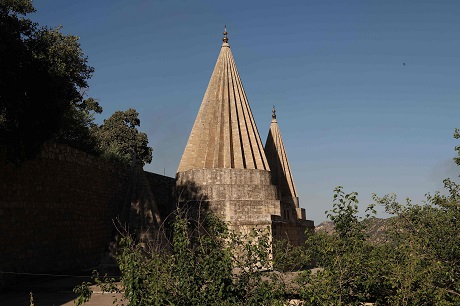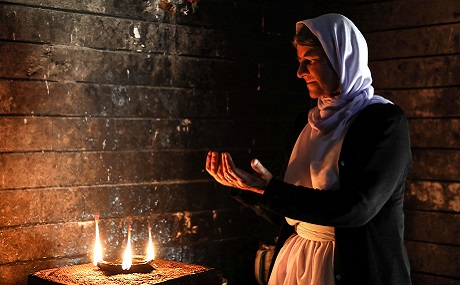US ambassador to Iraq secures $500,000 fund for Yezidi temple

ERBIL, Kurdistan Region – Lalish Temple, the spiritual home of the Yezidi minority in Duhok, has received a $500,000 grant from the US government to fund its restoration, US Ambassador to Baghdad Mathew Tueller announced Thursday.
Tueller visited Lalish on Thursday alongside Steve Fagin, the US consul general to Erbil, where he announced the funding.
“We are happy to announce the United States has provided $500,000 in order to renovate the Lalish Temple,” Tueller told a press conference in the picturesque Yezidi village.
“The project will be supervised by Pennsylvania University with some local implementers, and the aim of the project is to renovate some parts of Lalish Temple that are in a very bad condition,” he added.
The ambassador said the project was launched in order to preserve the Yezidi community’s holy sites and valuable icons.
The Yezidi faith is among the world’s oldest religions. The exact date Lalish was established is unknown. Historians and archaeologists believe the site could be at least 4,000 years old and a part of Sumer and other ancient civilizations.
Lalish temple is tucked away in a secluded valley 9 kilometers from the town of Sheikhan and 40 kilometers east of Duhok city.
Yezidis usually gather here with their spiritual leaders for their most important rituals. Followers are expected to make at least one pilgrimage to Lalish in their lifetime.
Visitors are expected to remove their shoes before entering the village as a sign of respect.
Most of the structural damage in Lalish is due to its age and a lack of maintenance.
Yezidi survivor and Nobel Peace Prize laureate Nadia Murad is currently in Washington DC for the three-day Ministerial to Advance Religious Freedom, which began July 16.
Murad used the occasion to repeat her call on the international community to support the Yezidi community, which is in danger of vanishing completely.
“If we abandon the Yezidi community, we are helping ISIS accomplish its goal of eradicating the Yezidis from their homeland. It is imperative that we urge the world to protect religious minorities globally,” Murad said Wednesday, referring to the 2014 Islamic State genocide.
“Next month will mark the fifth anniversary of the Yezidi genocide. If the international community does not act swiftly, my community will disappear from their homeland.”
“I am not here to paint a dark picture. I am here to present the reality on the ground. I am here to tell you that the work is not done yet. Before it’s too late we must act. We must act to make it possible for all communities to return to Shingal, including Muslims, Christians, and others,” she added.
The Ministerial to Advance Religious Freedom brings together religious minority leaders from across the globe to discuss challenges to religious freedom and identify ways to address religious persecution and discrimination.
Murad met with US President Donald Trump on Wednesday. She told him the dispute between Baghdad and the Kurdistan Regional Government (KRG) over who should control Shingal is preventing Yezidis from returning.
It has been almost five years since ISIS militants seized Shingal, murdering thousands of Yezidi men, forcing boys into military training, and taking women and girls hostage.
Of the 550,000 Yezidis in Iraq prior to the ISIS war, at least a third of them have emigrated and 360,000 remain displaced to camps in the Kurdistan Region.
The fate of around 2,992 Yezidis remains unknown, according to the most recent figures from the KRG’s office for Yezidi affairs.
Teams in Iraq supported by the United Nations Investigative Team to Promote Accountability for Crimes Committed by Daesh/ISIS (UNITAD) continue to search for mass graves primarily around Mosul and Shingal.


Tueller visited Lalish on Thursday alongside Steve Fagin, the US consul general to Erbil, where he announced the funding.
“We are happy to announce the United States has provided $500,000 in order to renovate the Lalish Temple,” Tueller told a press conference in the picturesque Yezidi village.
“The project will be supervised by Pennsylvania University with some local implementers, and the aim of the project is to renovate some parts of Lalish Temple that are in a very bad condition,” he added.
The ambassador said the project was launched in order to preserve the Yezidi community’s holy sites and valuable icons.
The Yezidi faith is among the world’s oldest religions. The exact date Lalish was established is unknown. Historians and archaeologists believe the site could be at least 4,000 years old and a part of Sumer and other ancient civilizations.
Lalish temple is tucked away in a secluded valley 9 kilometers from the town of Sheikhan and 40 kilometers east of Duhok city.
Yezidis usually gather here with their spiritual leaders for their most important rituals. Followers are expected to make at least one pilgrimage to Lalish in their lifetime.
Visitors are expected to remove their shoes before entering the village as a sign of respect.
Most of the structural damage in Lalish is due to its age and a lack of maintenance.
Yezidi survivor and Nobel Peace Prize laureate Nadia Murad is currently in Washington DC for the three-day Ministerial to Advance Religious Freedom, which began July 16.
Murad used the occasion to repeat her call on the international community to support the Yezidi community, which is in danger of vanishing completely.
“If we abandon the Yezidi community, we are helping ISIS accomplish its goal of eradicating the Yezidis from their homeland. It is imperative that we urge the world to protect religious minorities globally,” Murad said Wednesday, referring to the 2014 Islamic State genocide.
“Next month will mark the fifth anniversary of the Yezidi genocide. If the international community does not act swiftly, my community will disappear from their homeland.”
“I am not here to paint a dark picture. I am here to present the reality on the ground. I am here to tell you that the work is not done yet. Before it’s too late we must act. We must act to make it possible for all communities to return to Shingal, including Muslims, Christians, and others,” she added.
The Ministerial to Advance Religious Freedom brings together religious minority leaders from across the globe to discuss challenges to religious freedom and identify ways to address religious persecution and discrimination.
Murad met with US President Donald Trump on Wednesday. She told him the dispute between Baghdad and the Kurdistan Regional Government (KRG) over who should control Shingal is preventing Yezidis from returning.
It has been almost five years since ISIS militants seized Shingal, murdering thousands of Yezidi men, forcing boys into military training, and taking women and girls hostage.
Of the 550,000 Yezidis in Iraq prior to the ISIS war, at least a third of them have emigrated and 360,000 remain displaced to camps in the Kurdistan Region.
The fate of around 2,992 Yezidis remains unknown, according to the most recent figures from the KRG’s office for Yezidi affairs.
Teams in Iraq supported by the United Nations Investigative Team to Promote Accountability for Crimes Committed by Daesh/ISIS (UNITAD) continue to search for mass graves primarily around Mosul and Shingal.


